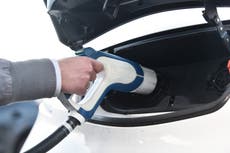Jeff Bezos and Bill Gates back hydrogen plane start-up with $38m
The start-up has completed ten test flights with a six-seater propeller plane powered by hydrogen
Your support helps us to tell the story
From reproductive rights to climate change to Big Tech, The Independent is on the ground when the story is developing. Whether it's investigating the financials of Elon Musk's pro-Trump PAC or producing our latest documentary, 'The A Word', which shines a light on the American women fighting for reproductive rights, we know how important it is to parse out the facts from the messaging.
At such a critical moment in US history, we need reporters on the ground. Your donation allows us to keep sending journalists to speak to both sides of the story.
The Independent is trusted by Americans across the entire political spectrum. And unlike many other quality news outlets, we choose not to lock Americans out of our reporting and analysis with paywalls. We believe quality journalism should be available to everyone, paid for by those who can afford it.
Your support makes all the difference.Bill Gates and Jeff Bezos have invested in a hydrogen plane start-up to develop zero-emission commercial aircraft.
The company, ZeroAvia, said on Wednesday it had raised $37.7 million from the UK government and investors including Bill Gates’ Breakthrough Energy Ventures, Amazon.com Inc., and oil and gas company Royal Dutch Shell.
The start-up, based in London and California, has completed ten test flights with a six-seater propeller plane powered by hydrogen.
ZeroAvia, which has been conducting test flights in the UK, is initially aiming for commercial flights in the 500-mile range, using 10- 20-seat aircraft.
“This project is instrumental for delivering a market-ready hydrogen powered solution for 2023 that makes passenger-ready zero carbon aviation a reality,” said ZeroAvia Chief Executive Val Miftakhov in a statement.
The next goal is for commercial jets for up to 200 passengers that can travel 3,000 miles by 2030.
Hydrogen, which produces water when it burns, is seen as a potential alternative for the aviation industry, a major user of fossil fuels which contributes to the climate crisis.
Hydrogen can be made from fossil fuels or from water using electrolysis, although this an expensive process.
“This is a capital-intensive industry, so having investors to help you through the process is very important,” Mr Miftakhov told Reuters, saying a plane was “a power-hungry machine, especially on take off.”
Mr Miftakhov said his startup expected to have planes for cargo flights in operation before commercial passenger planes.
ZeroAvia has also teamed up with British Airways to explore how the carrier could shift to hydrogen-powered planes in future.
Reuters contributed to this report




Join our commenting forum
Join thought-provoking conversations, follow other Independent readers and see their replies
Comments